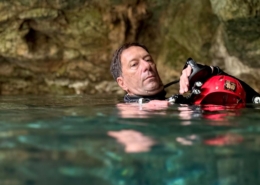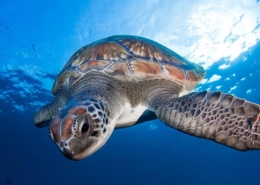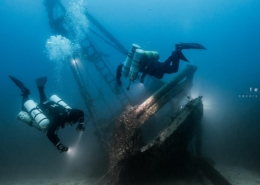How More MPAs Can Mean More Income From Dive Tourism
News Release by Alex Brylske, Ph.D.
News Release
A newly published study sponsored by the National Geographic Pristine Seas Program shows that protecting the world’s most popular scuba diving sites from fishing or any other extractive activities could not only help marine life recover but also generate an additional $2 billion for coastal economies. The study also estimates that fully protecting all unprotected dive sites could increase marine life (biomass) by 113% on average.
According to researchers at Australia’s James Cook University, about 33 million dives take place in the ocean each year, but only 15% of dive sites are in highly or fully protected marine protected areas (MPAs). Analysis of these sites showed that enforcing highly and fully protected MPAs within existing recreational diving locations would increase the demand for diving, the number of dives by 32% (or 10.5 million more dives per year), and dive industry revenue by US $616 million annually. When access fees are introduced in tandem with dive site protection upgrades, it is possible to generate an extra $2 billion per year from access fees without impacting dive numbers.
Researchers also found that the “consumer surplus,” which is the measure of what someone is willing to pay for a scuba diving experience versus what the actual cost is, amounts to $2.7 billion per year. As the study’s lead author, Dr. Reniel Cabral, explained, “In other words, divers would willingly pay more for the experience, driving up the profitability of the sector.”
Read more about the study:
How Protected Marine Areas Could Bring $2.7 Billion to Scuba Tourism
https://www.forbes.com/sites/emesemaczko/2025/02/26/a-billion-dollar-untapped-business-opportunity-through-protecting-the-worlds-dive-sites/
Cabral, R.B., Millage, K.D., Mayorga, J., Kordell, T., Kelkar, M., Caughman, A.M., Favoretto, F., Schuhbauer, A., Aburto-Oropeza, O., Sala, E., Bradley, D., 2025. Marine protected areas for dive tourism. Scientific Reports. https://doi.org/10.1038/s41598-024-83664-1
Editor’s note:
Aside from the economic benefit detailed in the article, there are many more reasons divers should support the establishment of marine protected areas and specifically what’s known often as the “30 by 30 Initiative” (formally Target 3 of the Kunming-Montreal Global Biodiversity Framework), which aims to conserve at least 30 percent of the planet’s land and marine areas by 2030. Here are some reasons why the interests of the diving community are directly aligned with protecting and restoring marine biodiversity.
1- Protecting Dive Sites and Marine Ecosystems
Scuba divers depend on healthy oceans. Coral reefs, kelp forests, seagrass beds, and vibrant marine life are what make diving worthwhile. Target 3 promotes the protection of these ecosystems from overfishing, pollution, and destructive practices, helping preserve them for future generations.
2- Combating Ocean Degradation
Target 3 supports ecosystems that play a crucial role in climate regulation, such as coral reefs and mangroves. Scuba divers, who witness firsthand the impacts of coral bleaching and habitat destruction, are natural advocates for climate-resilient oceans.
3- Empowering Divers as Ocean Ambassadors
Divers often become vocal advocates for marine protection due to their unique perspective beneath the surface. Supporting Target 3 provides a framework for their advocacy and a tangible, global goal to rally behind.
4- Fostering Responsible and Sustainable Diving
Target 3 promotes better marine management, which aligns with diver ethics like “take only pictures, leave only bubbles.” It encourages dive operators and organizations to follow sustainable practices and contribute to conservation initiatives.
In summary, the diving community directly benefits from protected marine areas through better experiences, thriving ecosystems, and resilient local economies. Supporting Target 3 is both a moral and practical choice to ensure the underwater world divers love continues to flourish.












Leave a Reply
Want to join the discussion?Feel free to contribute!